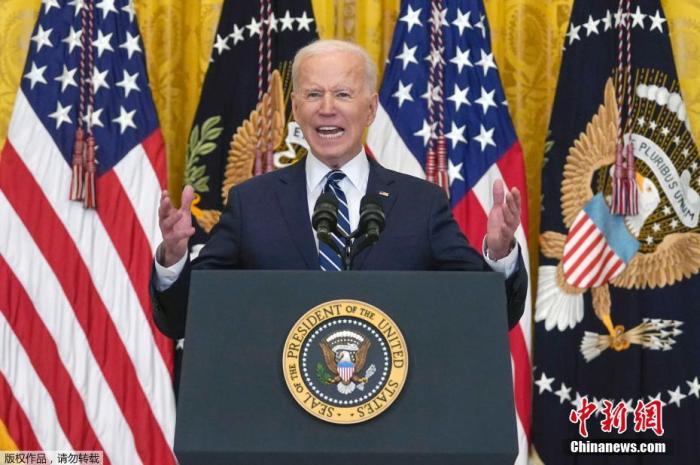China News Service, Washington, May 29 (Reporter Chen Mengtong) The White House Administration and Budget Bureau announced on the 28th the federal government budget for the 2022 fiscal year with a total of 6 trillion US dollars. The federal budget deficit for the new fiscal year is about 1.83 trillion. US dollars.
This is Biden’s first budget after taking office. It mainly includes: 1.5 trillion US dollars in the disposable budget of the federal government, and 84 billion US dollars for the "U.S. Employment Program" aimed at increasing infrastructure construction. The "American Family Plan" for education and health insurance provided $15.8 billion in funding.
Data map: US President Biden.
American public opinion pointed out that this budget covers major legislative motions introduced since Biden took office.
Given the stark opposition shown by Republicans in Congress and the stagnant bipartisan negotiations, this budget, like all presidential budgets, is likely to be shelved in Congress.
High budgets, high deficits, and high taxes have become the universal appraisal of this budget in the US media.
The Wall Street Journal pointed out that this budget shows that the Biden administration will substantially increase the taxation of businesses and high-income households to balance the increased fiscal expenditures.
According to this budget, the Biden administration intends to increase the corporate tax rate from 21% to 28%.
At the same time, it also plans to expand the staffing of the US Internal Revenue Service and further strengthen tax enforcement.
The US media pointed out that the 28th is the last working day before the "small holiday" of Memorial Day in the United States. Choosing to announce the budget at this point indicates that the White House does not want the "bad news" of the deficit to attract too much attention.
According to this budget estimate, due to the introduction of large-scale economic stimulus measures during the epidemic, the federal fiscal deficit in the United States in fiscal 2020 will reach a record of 3.13 trillion U.S. dollars, and the fiscal deficit in fiscal 2021 is expected to reach 3.66 trillion U.S. dollars in fiscal 2022. The annual budget deficit is US$1.83 trillion.
According to data from the US Treasury Department, in the first half of fiscal 2021 (October 2020 to March 2021), the US federal government budget deficit rose to US$1.7 trillion, a record high over the same period in history.
As of May 26, the total US Treasury debt has exceeded 28.1 trillion US dollars.
The Associated Press pointed out that the multiple rounds of economic relief bills passed during the epidemic totaled about 5 trillion U.S. dollars, and the U.S. Treasury debt will soon exceed 30 trillion U.S. dollars.
This means that for every dollar spent by the US government this year and next, it must borrow about 50 cents.
"The president's budget is just a proposal." Richard Shelby, a Republican member of the Senate Appropriations Committee, said on the 28th that Biden's budget increased taxes, excessive spending, and insufficient defense budgets, which undermined national security.
Senate Budget Committee Republican Lindsey Graham accused the White House's budget of "outrageously high" and a substantial increase in non-defense spending and taxes would weaken the Pentagon.
In the $1.5 trillion government department budget, the U.S. Department of Defense budget expenditure for fiscal year 2022 is $71.5 million, an increase of 1.6% over the previous fiscal year.
In contrast, the U.S. Department of Education’s budget for the new fiscal year increased by 40.8% year-on-year, and the Department of Health and Human Services increased by 23.4% year-on-year.
The New York Times pointed out that the Biden government budget relied on tax increases to companies and wealthy people and federal borrowing, and lacked a clear policy path for promoting fiscal balance and reducing national debt.
American economists pointed out that although tax increases can play a certain role in alleviating fiscal pressures, they cannot fundamentally solve the problem of long-term high fiscal deficits in the United States.
William Hoagland, deputy director of the US Bipartisan Policy Research Center, believes that the budget is "bold, encouraging, but also somewhat radical and problematic."
(Finish)

